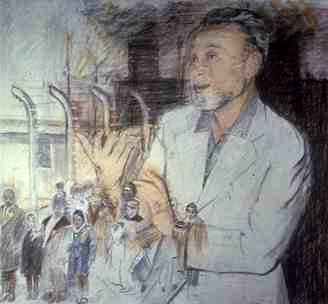We will have the thankless task of proving to a world which will refuse to listen, that we are Abel, the murdered brother.
– Ignasy Shiper (historian, killed at Majdanek in 1943)
 In his acclaimed book Survival in Auschwitz, Primo Levi recounts a recurring dream he and other inmates had in the Nazi death camp: that he returned home to his family and told them about it, but nobody listened. “The person standing in front of me doesn’t stay to hear, turns around and goes away,” he writes.
In his acclaimed book Survival in Auschwitz, Primo Levi recounts a recurring dream he and other inmates had in the Nazi death camp: that he returned home to his family and told them about it, but nobody listened. “The person standing in front of me doesn’t stay to hear, turns around and goes away,” he writes.

 The Bloomsbury Companion to Holocaust Literature is a comprehensive reference resource including a wealth of critical material on a diverse range of topics within the literary study of Holocaust writing. At its centre is a series of specially commissioned essays by leading scholars within the field: these address genre-specific issues such as the question of biographical and historical truth in Holocaust testimony, as well as broader topics including the politics of Holocaust representation and the validity of comparative approaches to the Holocaust in literature and criticism.
The Bloomsbury Companion to Holocaust Literature is a comprehensive reference resource including a wealth of critical material on a diverse range of topics within the literary study of Holocaust writing. At its centre is a series of specially commissioned essays by leading scholars within the field: these address genre-specific issues such as the question of biographical and historical truth in Holocaust testimony, as well as broader topics including the politics of Holocaust representation and the validity of comparative approaches to the Holocaust in literature and criticism. In Holocaust Memory Reframed, Jennifer Hansen-Glucklich examines representations in three museums: Israel’s Yad Vashem in Jerusalem, Germany’s Jewish Museum in Berlin, and the United States Holocaust Memorial Museum in Washington, D.C. She describes a variety of visually striking media, including architecture, photography exhibits, artifact displays, and video installations in order to explain the aesthetic techniques that the museums employ. As she interprets the exhibits, Hansen-Glucklich clarifies how museums communicate Holocaust narratives within the historical and cultural contexts specific to Germany, Israel, and the United States.
In Holocaust Memory Reframed, Jennifer Hansen-Glucklich examines representations in three museums: Israel’s Yad Vashem in Jerusalem, Germany’s Jewish Museum in Berlin, and the United States Holocaust Memorial Museum in Washington, D.C. She describes a variety of visually striking media, including architecture, photography exhibits, artifact displays, and video installations in order to explain the aesthetic techniques that the museums employ. As she interprets the exhibits, Hansen-Glucklich clarifies how museums communicate Holocaust narratives within the historical and cultural contexts specific to Germany, Israel, and the United States. Standing on Polish soil is to stand upon the fertile ground of memory. Poles see themselves as a people who have struggled to maintain their national identity amidst occupation and oppression. The Polish past is negotiated on a daily basis between the generations of Poles who lived (or grew up) during World War II, those who lived during the Soviet regime, and those who have come of age after the fall of Communism. All three of these groups have grown up with the narrative of Poles as rescuers, resisters and martyrs. This idea was shaped during the Soviet years and reinforced through Polish popular culture.
Standing on Polish soil is to stand upon the fertile ground of memory. Poles see themselves as a people who have struggled to maintain their national identity amidst occupation and oppression. The Polish past is negotiated on a daily basis between the generations of Poles who lived (or grew up) during World War II, those who lived during the Soviet regime, and those who have come of age after the fall of Communism. All three of these groups have grown up with the narrative of Poles as rescuers, resisters and martyrs. This idea was shaped during the Soviet years and reinforced through Polish popular culture. Commemorating the Holocaust: The Dilemmas of Remembrance in France and Italy reveals how and why the Holocaust came to play a prominent role in French and Italian political culture in the period after the end of the Cold War. By charting the development of official, national Holocaust commemorations in France and Italy, Rebecca Clifford explains why the wartime persecution of Jews, a topic ignored or marginalized in political discourse through much of the Cold War period, came to be a subject of intense and often controversial debate in the 1990s and 2000s.
Commemorating the Holocaust: The Dilemmas of Remembrance in France and Italy reveals how and why the Holocaust came to play a prominent role in French and Italian political culture in the period after the end of the Cold War. By charting the development of official, national Holocaust commemorations in France and Italy, Rebecca Clifford explains why the wartime persecution of Jews, a topic ignored or marginalized in political discourse through much of the Cold War period, came to be a subject of intense and often controversial debate in the 1990s and 2000s. Noemi Schory, a documentary film director and producer, was the Schusterman Visiting Artist in Residence at the Center for Jewish Studies 2013 Fall Semester. Schory taught The Holocaust in Film: Recent Israeli and German Documentaries Compared and spoke at various film screenings and events on campus and in the community. Schory produced the award-winning documentary film “
Noemi Schory, a documentary film director and producer, was the Schusterman Visiting Artist in Residence at the Center for Jewish Studies 2013 Fall Semester. Schory taught The Holocaust in Film: Recent Israeli and German Documentaries Compared and spoke at various film screenings and events on campus and in the community. Schory produced the award-winning documentary film “